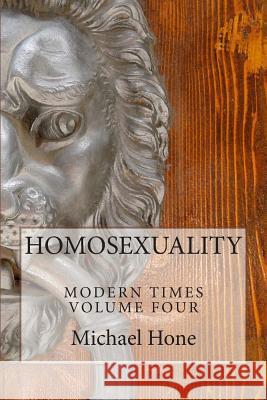HOMOSEXUALITY Modern Times Volume Four » książka
HOMOSEXUALITY Modern Times Volume Four
ISBN-13: 9781496085122 / Angielski / Miękka / 2014 / 244 str.
This is the fourth and last volume of a series on homosexuality. Volume One, The Ancient Greeks, was incredibly enjoyable because not only did all the Greeks practice boy-love, they vied with other writers and poets to show to what extent boy-love was beautiful. There was even a law in Thebes proclaiming ''that it is illegal for anyone to maintain that sex between men is not beautiful.'' In fact, it was so all-encompassing that one boy, who failed to succumb to the love of those of his sex, begged Zeus to change him so he wouldn't be different from others; when this failed to happen, he killed himself. Volume Two, Ancient Rome, was far more difficult because although the men engaged in male-male sexual activity, the threat of being accused of being passive during the act forced them to be very discreet; even Caesar fought all his life to contain the period when he was King Nicomedes' beloved. In Renaissance Florentine male-male relations described in Volume Three were against the law even though, from puberty on, they were a boy's only outlets (girls being totally inaccessible). Consequently, the penalties for those caught were very light. This volume, number four, was the easiest to write and is by far the longest because it concerns modern times. In fact, it's the story of my life, my adolescence in the citadel of the Mormons, followed by my own personal Renaissance when I left the Queen Elizabeth at Cherbourg and enrolled at the Sorbonne, just in time for the student revolts of '68. Being gay in America had been a nightmare and being gay in France was hardly easier. True, cops weren't searching through the French equivalent of Central Park to flush out perverts, and there were certainly no riots for gay rights as at Stonewall in N.Y. in 1969, but one was out of his mind to come out in Paris, and despite the new French law permitting gay marriage, homosexuality is still a perversion here among the population in general (and there are monthly demonstration, against the gay marriage law, to prove it). My life in the States had been turbulent from birth, and it was not less so in France: first love found in the Salles des Vases grecs in the Louvre, a year of love and death in Berlin, the demise of my lover in Myconos (all years before the first case of the gay plague, if that's what you're thinking), murders in the South of France (all true, alas ) and other twists and turns, all veritable, all comprising a life in which I loved and benefited from others, in which others, I hope, loved and benefited from me. My life began in Cherbourg and it will end here, on the Atlantic Coast of my adopted, my adored country.
Zawartość książki może nie spełniać oczekiwań – reklamacje nie obejmują treści, która mogła nie być redakcyjnie ani merytorycznie opracowana.











